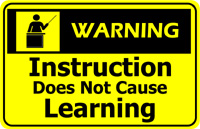It’s been a couple of years now since my Mom passed, and from time to time I think about the stuff that I learned from her. (Often those were things that I rejected for years and then realized that she’d been right about all along. Those of you who are still young’uns should be aware of this phenomenon. The older you get, the smarter your parents were.)
Mom was a teacher. She attended “Miss Wood’s Kindergarten-Primary Training School” in the 1940′s in St. Paul, Minnesota. This prepared her to mold young minds and care for children in what was then known as “Nursery School”.
Throughout her life, she worked in daycare, kindergarten, and the K-12 system. But I’ve found that things haven’t really changed much — despite all the experts who have researched how to improve education. The fundamental things apply, as time goes by.
A few nights ago, I sat in a large room with a bunch of people wearing nice suits and ties. (I don’t wear a tie anymore, unless it’s a funeral. And I don’t own a suit.) They represented different local educational entities — colleges, public schools, and so forth. They were forming yet another group to solve all the problems in our state educational system.
Kind of like the mice getting together to deal with the cheese problem. Most of the people in the room felt that:
a) There wasn’t enough cheese; or
b) The way we measured cheese was wrong; or
c) Their particular cheese didn’t smell bad.
I listened for quite a while, and then opened my big yap to observe that improving education really wasn’t rocket surgery. The way we teach reading hasn’t changed a lot since my mom’s day. Or how we add two numbers. Or how many planets there are. (Apologies, Pluto.)
What HAS changed is the expectations we have for classroom teachers, and the students that we give them. We now think our teachers are going to teach things like self-esteem, world view, diversity, manners, and political correctivity. And the students we supply them often have only one parent, haven’t had breakfast, and watch television for 12 hours a day to keep them occupied.
In a state where 50% of the students don’t complete high school (and yes, there were even people arguing about THAT statistic) it pains me to see yet another research group started. As a teacher/trainer, I told them it was a simple, three step process:
1. Establish measurable goals: reading, writing, ‘rithmetic
2. Choose and use a proven curriculum — from a state that succeeds
3. Measure success — and lose the teachers that can’t cut it
Had I let a loud, juicy fart in the room it couldn’t have gotten quieter. Thank goodness they didn’t have anything to throw. The moderator mumbled something about “negativity” and moved on.
I’m not sure what their next steps will be, but I’m pretty sure I won’t be invited. Probably need to split up into committees, form some fact-finding groups, develop a strategy, assess our current situation, consult with all the stakeholders, revise the plan, and prepare an RFP for a team of consultants.
Pretty sure Mom is whirling like a top.

{ 2 comments… read them below or add one }
Having dipped my toe into the teaching pond for a year ( taught at a college), I totally concur with your three “solutions”. Unfortunately, our teaching ranks demand a loyalty that means anybody with the “teacher” status has nothing to do with the problem of students “under achieving”.
I used to ask a question of anybody who professed teaching talent. “If you were teaching them to fly would you want to be a passenger?”
Reading, writing, and arithmetic are absolutely it – plus teaching children how to find out what else they want or need to know. The idea that teachers are all fabulous when the evidence clearly suggests otherwise is bullshit. There are people who suck in every profession; weed them out and move on.
Mediocrity will always hide behind committees and process.